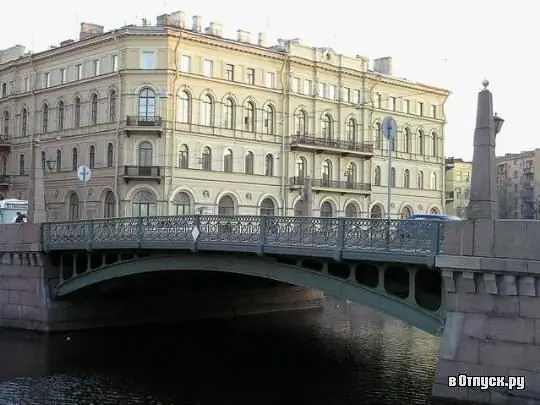
Description of the attraction
The Kisses Bridge connects the 2nd Admiralteisky and Kazan Islands across the Moika. Kisses Bridge is one of the iconic places of St. Petersburg, with which many legends, customs and traditions are associated. According to one of the legends, this bridge was a place where young lovers met, who for various reasons were forced to hide their feelings. Throughout its existence, thanks to its romantic name Kisses, the bridge has been "overgrown" with many legends. Many legends are associated with the origin of the name of the bridge itself. There is a legend that at the time when the Moika was the border of the city, this bridge served as a place for meetings and farewells. Other myths say that St. Petersburg lovers had a custom of kissing as they walk along the Kissyev Bridge, and at the same time, promising to never part with each other. Another legend says that passers-by on the Kissing Bridge must have kissed, regardless of whether they knew each other.
Kisses Bridge is a monument dating back to the early days of cast-iron bridge construction, which has retained its appearance since the early 19th century.
At the beginning of the 18th century. on the site of the current Potseluev Bridge there was a crossing over the Moika, which was built by the townspeople themselves from scrap materials. During the construction of granite embankments on the Moika in 1738. a wooden pedestrian bridge was built in this place. It had a lifting part to let the mast vessels sailing along the river pass. In those days, the bridge was also called Tsvetnoy, because it was painted in different colors. In order to cross the bridge of horse-drawn transport in 1768. the construction of the bridge was changed: they made it three-span and installed stone supports.
The bridge got its present name in 1788. by the name of Nikifor Vasilyevich Potseluev, a merchant of the 3rd guild, who owned the Kiss drinking establishment on the left bank of the Moika River, at the corner of the present Glinka Street.
By the beginning of the 19th century. the bridge has fallen into disrepair and has ceased to meet the increased traffic loads. In this regard, in 1808-1816. the bridge was rebuilt according to the standard project of V. I. Geste, according to which all the bridges across the Moika were being built at that time. As a result, a new cast-iron, non-movable, single-span, sectional, arched bridge was erected, its supports are made of rubble masonry and have a granite cladding. According to Geste's project, four granite obelisks decorated with lanterns were erected at the entrances to the Kiss Bridge, which enriched the appearance of the Moika crossing. The metal structures of the bridge were manufactured in the Urals, at the factories of Nikita Demidov. The graceful railings of the bridge railing have remained unchanged to this day. She repeats the drawing of the fence on the Moika embankments. The Petersburg iron foundry was engaged in its manufacture.
The first major reconstruction of the bridge was needed after a severe flood that occurred in 1824, it almost completely destroyed the bridge.
In order to lay tram tracks across the bridge in 1907-08. The Kisses Bridge was reconstructed, but its appearance was preserved, although during the restoration the granite obelisks were lost. The author of the new design was the engineer A. P. Pshenitskiy. The sidewalks were carried out on consoles, due to which the roadway of the bridge was widened. The supporting structures of the bridge were replaced with steel double-hinged arches, which are assembled with rivets.
In 1952. under the direction of the architect A. L. Rotach carried out the restoration of the bridge, during which four obelisks appeared again on the Kissy Bridge, which are crowned with balls with four-sided lamps, repeating the lanterns of the Red Bridge. During the restoration, which took place in 1969.other decorative elements of the bridge were restored and the lanterns were gilded.
Today, the Kisses Bridge is still an object of urban myth-making. This bridge is a must-see for newlyweds. It is believed that the longer they kiss here, the longer their happiness together will last. An even greater effect will be obtained if the kiss takes place under the bridge. On the wedding day, young couples must drive or walk across the Kissing Bridge, kissing each other, while the kiss must begin on one side of the river and end on the other.






